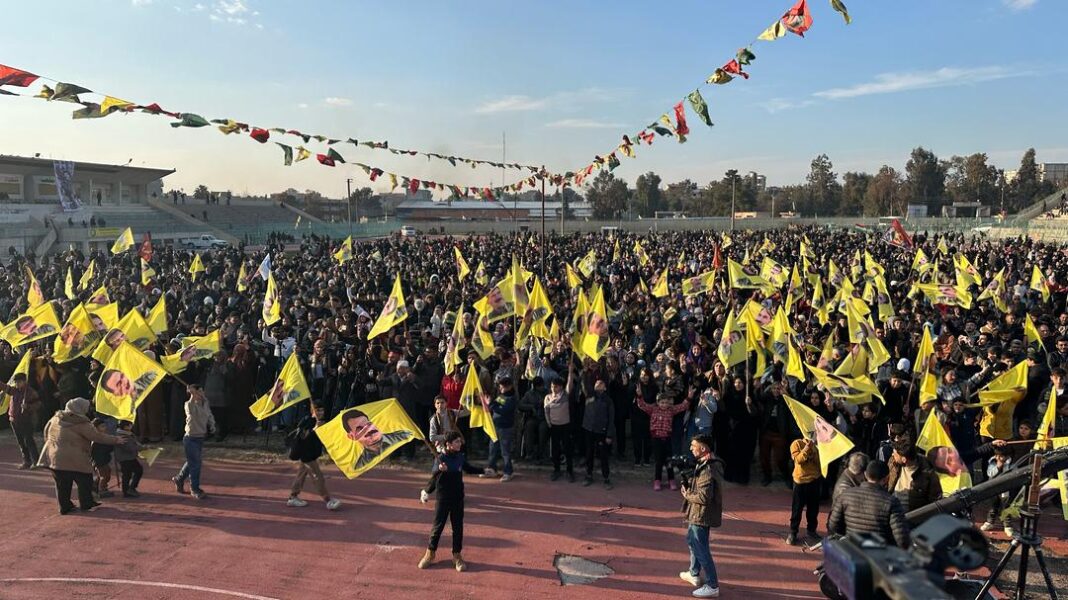Jailed Kurdistan Workers’ Party (PKK) leader Abdullah Öcalan on Thursday issued an unprecedented call for the militant group to lay down its arms and disband, a development that has drawn a cautious response from the Turkish government, celebrations among Kurds and initial silence from much of the opposition.
The statement, delivered by a delegation from the pro-Kurdish Peoples’ Equality and Democracy Party (DEM Party) following their visit to a prison on İmralı Island, marks the most direct appeal Öcalan has made for the group to dissolve itself in the four decades since the PKK took up arms against the Turkish state.
Ruling Justice and Development Party (AKP) Deputy Chairman Efkan Ala commented on Öcalan’s statement, emphasizing the necessity of PKK’s disbanding but stopping short of declaring the development a breakthrough.
“The essence of the call is the laying down of arms and the dissolving of the terrorist organization. We focus on the result,” Ala told the pro-government A Haber. “The AKP and our president have done everything necessary to remove terrorism from Turkey’s agenda. Now we must see if the organization complies with this call.”
Ala underscored the government’s continued commitment to counterterrorism, noting that Turkey has extended its operations beyond its borders and would press forward with efforts to eliminate the PKK if it does not heed Öcalan’s call.
Jubilation in Kurdish strongholds
The response among Kurds, particularly in Turkey’s southeastern Diyarbakır province and the Kurdish-majority areas of northeast Syria, was one of elation. Large crowds gathered in public squares to watch the announcement on large screens, and many were seen embracing and shedding tears of joy upon hearing the call for the laying down of arms.
Celebrations erupt in northeast Syria's Kurdish city of Qamishli, following PKK leader Abdullah Ocalan's historic declaration calling for the dissolution of the party's armed struggle against the Turkish state
: The New Region pic.twitter.com/GURFxr18Ni
— The New Region (@thenewregion) February 27, 2025
Celebrations erupted in Qamishli, a Kurdish-majority city in northeast Syria, with residents taking to the streets in support of Öcalan’s declaration. Kurdish political figures also reacted positively, with Salih Muslim, leader of the Democratic Union Party (PYD), which is viewed by Turkey as the PKK’s Syrian offshoot, signaling a willingness to transition toward politics rather than arms.
BREAKING — PKK’s Syrian wing PYD leader Salih Muslim says they agree with Ocalan’s statement
“There would be no need for weapons if we are allowed to work politically. If the reasons for carrying weapons disappear we will lay them down”
— Ragıp Soylu (@ragipsoylu) February 27, 2025
“There would be no need for weapons if we are allowed to work politically,” Muslim said, suggesting that the process of laying down arms is contingent on guarantees for democratic engagement.
What this means for the #SDF in #Syria is unclear.
The #PYD & its armed wings are the the #PKK's Syrian wing & the #SDF leader is a 35yr #PKK veteran who #Ocalan describes as "like a son." But the #SDF is more complex & I'd be stunned if it demilitarized. https://t.co/ZZZdAEE125
— Charles Lister (@Charles_Lister) February 27, 2025
While the government and pro-Kurdish circles reacted swiftly, opposition parties remained largely silent.
The main opposition Republican People’s Party (CHP) announced an emergency meeting of its Central Executive Board following Öcalan’s statement, signaling internal discussions on the matter.
The nationalist opposition İYİ (Good) Party, however, made its apprehensive stance clear by hanging a black banner on its headquarters that read, “We will not forget, we will not let it be forgotten. We honor our martyrs with respect, mercy and gratitude.”
The party also announced an emergency meeting at its headquarters to discuss Öcalan’s statement.
The first response from a European politician came from Nacho Sánchez Amor, the European Parliament’s rapporteur on Turkey, describing Öcalan’s call as “a historic step” and “the best starting point for a potential political and inclusive process.”
Meanwhile, analysts pointed to the broader implications of Öcalan’s call. Journalist İrfan Aktan characterized the moment as the beginning of a “negative peace process,” in which active conflict ceases but the necessary conditions for a sustainable peace remain unfulfilled.
Kemal Göktaş, editor-in-chief of the Kısa Dalga news website, stressed the importance of the Turkish state’s next steps. “Where will the militants and leaders go? Will there be a general amnesty? What kind of political participation will be allowed? These are the questions that now matter,” he said on Halk TV.
Journalist Saygı Öztürk noted that Öcalan’s message echoes previous statements he made in 1999, following his capture, when he urged the PKK to change course. “After all these years, after nearly 50,000 people have died, what has the organization gained, and why is it giving up now?” he asked.
What comes next?
While Öcalan’s call was historic, its immediate impact remains uncertain. The PKK leadership in northern Iraq has yet to respond, and questions persist about whether the group will comply with the call or whether it will attempt to negotiate conditions for disbanding.
Unlike past attempts at peace talks, which collapsed in 2015, this initiative has been openly backed by far-right Nationalist Movement Party (MHP) leader Devlet Bahçeli, a key ally of the Turkish President Recep Tayyip Erdoğan and his AKP, whose support was instrumental in bringing the process to this point. Bahçeli’s handshake with the DEM Party delegation in October marked the beginning of a shift that culminated in Thursday’s statement.
However, Turkish authorities have not yet outlined a roadmap for what happens if the PKK members indeed follow through with disbanding. There has been no indication of whether a legal framework for political participation or an amnesty process will be introduced.
For now, Turkey watches cautiously as the ball moves to the PKK’s court.



